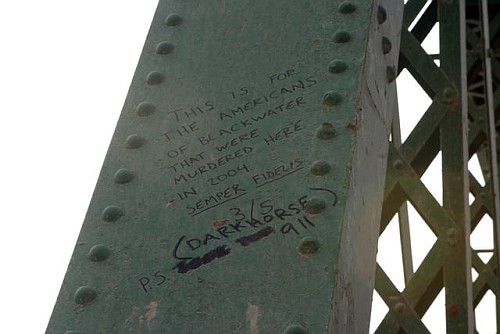
America’s armies have always relied in some way on contractors. However, the dramatic expansion of the role and number of contractors in Iraq is changing the culture of American warfare. According to the Los Angeles Times’s T. Christian Miller, newly released figures show that the number of U.S.-paid private contractors exceeds that of American combat troops—even after the surge. More than 180,000 civilians—including Americans, foreigners and Iraqis—are working in Iraq under U.S. contracts, according to State and Defense department figures obtained by the Los Angeles Times. This number is significantly higher than the 160,000 soldiers and few thousand civilian government employees currently stationed in Iraq.
Even these mounting numbers do not capture the full picture, as private security contractors hired to protect government officials and buildings were not counted in the survey. The number of contractors includes at least 21,000 Americans, 43,000 foreign contractors and about 118,000 Iraqis—all employed in Iraq by U.S. tax dollars, according to the most recent government data.
Military experts have criticized the continuing expansion and uncertainty over the numbers of armed contractors.
The total number of private contractors shows how heavily the Bush administration has relied on corporations to carry out the occupation of Iraq—a mission criticized as being undermanned.
However, not all commentary on the use of contractors is negative. Military officials say contractors cut costs while allowing troops to focus on fighting rather than on other tasks. “The only reason we have contractors is to support the war fighter,” said Gary Motsek, the assistant deputy undersecretary of Defense who oversees contractors. “Fundamentally, they are supporting the mission as required.”
The most controversial contractors are those working for private security companies. These companies include names such as Blackwater, Triple Canopy, and Erinys. Their work ranges from driving fuel trucks, cooking meals, and cleaning toilets, to servicing advanced weapons systems and guarding senior U.S. officials. In many cases, these security contractors are serving along-side our troops in roles that are often indistinguishable from those of the Armed Forces. The security industry has faced enormous growth in recent years, as security contractors have increasingly been used to offset chronic troop shortages.
The number of private security contractors in Iraq remains unclear despite Central Command’s latest consensus. The Times identified 21 security companies in the Central Command database, deploying 10,800 men. However, the Defense Department’s Motsek, who monitors contractors, said the Pentagon estimated the total was 6,000. Both figures are far below the private security industry’s own estimate of about 30,000 private security contractors.
Industry officials say that private security companies helped reduce the number of troops needed in Iraq and provided jobs to Iraqis—a benefit in a country with high unemployment.
Stan Soloway, president of the Professional Service Council, a contractors’ trade group, said the number of Iraqis reflected the importance of the reconstruction and economic development efforts to the overall U.S. mission in Iraq.
Although security contractors have become an integral part of our war in Iraq, they have also drawn some of the sharpest criticism, much of it from military policy experts who say their jobs should be done by the military. Others worry that private security contractors lack accountability, and the lack of accurate and updated information available makes it difficult for Congress to exercise proper oversight. U.S. soldiers in Iraq are guided by rules of engagement tailored to address the particular circumstances of any operation. A violation of the rules of engagement will usually trigger an inquiry of some sort, and in serious cases, disciplinary action. There is no similar oversight and enforcement mechanism for contractors, who appear to operate outside the military chain of command and justice systems. Contractors are required to report “incidents,” and the product, so-called “Special Incident Reports” have been treated as highly classified data by the Pentagon, which continues to resist all attempts to have them disclosed.
“We don’t have control of all the coalition guns in Iraq. That’s dangerous for our country,” said William Nash, a retired Army general and reconstruction expert. The Pentagon “is hiring guns. You can rationalize it all you want, but that’s obscene.”
Leslie Fields contributed to this post.


